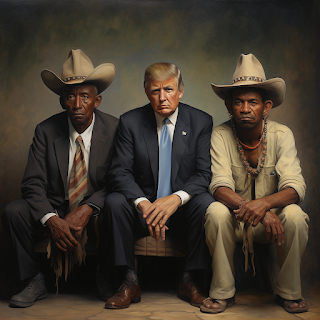The following was created entirely by ChatGPT and Midjourney, with myself doing the prompting.
Here we now present:
A comprehensive list of bigoted statements and actions by Donald Trump contextualized into art, as exhaustively as my knowledge permits.
2. **Muslim Ban:** During his campaign, Trump called for a "total and complete shutdown of Muslims entering the United States."
10. **Muslim Travel Ban:** In 2017, Trump signed an executive order temporarily banning citizens from several Muslim-majority countries from entering the United States.
14. **Muslim Registry Proposal:** During his campaign, Trump indicated support for a database to track Muslims in the United States.
4. **"Both Sides" Comment:** Following violence in Charlottesville in 2017, Trump equated white supremacists with counter-protesters, stating there were "very fine people on both sides."
24. **Refusal to Condemn White Supremacists:** During a presidential debate, Trump refused to outright condemn white supremacists.
25. **Refusal to Denounce David Duke:** Trump initially refused to disavow the endorsement of former KKK leader David Duke.
5. **"Shithole Countries" Remark:** In a 2018 meeting about immigration, Trump referred to certain countries in Africa, Haiti, and El Salvador as "shithole countries."7. **Anti-Semitic Stereotypes:** Trump employed stereotypes about Jewish people's wealth and loyalty, as seen in his remarks to a group of Jewish Republicans in 2019.
11. **Transgender Military Ban:** Trump announced a ban on transgender individuals serving in the military, drawing criticism for discrimination.
16. **Attack on Black Athletes:** Trump criticized black athletes, like Colin Kaepernick, who kneeled during the national anthem as a protest against racial injustice and police brutality.
8. **Pocahontas Slur:** Trump repeatedly used the derogatory term "Pocahontas" to refer to Senator Elizabeth Warren, making light of her claims of Native American heritage.
22. **Attack on Elizabeth Warren's Heritage:** Beyond the "Pocahontas" slur, Trump challenged Senator Warren to take a DNA test to prove her Native American heritage.
6. **Attack on Congresswoman Ilhan Omar:** Trump targeted Congresswoman Omar with tweets suggesting she should "go back" to her home country, even though she is a naturalized U.S. citizen.
9. **Mocking a Disabled Reporter:** Trump mocked a disabled reporter on video during his campaign, an action criticized as insensitive.
19. **Birther Conspiracy:** Trump perpetuated the birther conspiracy theory, falsely claiming President Obama was not born in the United States.
21. **Attacks on Megyn Kelly:** Trump made sexist remarks about Megyn Kelly, a Fox News anchor, implying she asked tough questions because she was menstruating.
12. **"Go Back" to Congresswomen:** Trump targeted Congresswomen of color, suggesting they should "go back and help fix the totally broken and crime-infested places from which they came."
17. **Racial Housing Discrimination Lawsuit:** Trump's real estate company faced lawsuits accusing it of discriminating against black renters in the 1970s. This picture was prompted by the sentence you just read. it was too weird not to use.
18. **Attack on Gold Star Family:** Trump criticized Khizr and Ghazala Khan, parents of a Muslim-American soldier killed in Iraq, after they spoke at the Democratic National Convention.
31. **Attack on Maxine Waters:** Trump referred to Congresswoman Maxine Waters as "an extraordinarily low IQ person."
32. **Use of "Paddy Wagon" Stereotype:** Trump used the term "paddy wagon" to describe police vehicles, evoking derogatory stereotypes about Irish-Americans.
33. **Attack on Greta Thunberg:** Trump mocked teenage climate activist Greta Thunberg, leading her to change her Twitter bio to reflect his comments.
34. **Attack on John Lewis:** Trump disparaged the late Congressman John Lewis, a civil rights icon, saying he was "all talk" and "no action."
35. **Attack on NFL Protests:** Trump criticized NFL players kneeling during the national anthem, implying they were unpatriotic.
36. **Attack on Ghazala Khan:** Trump suggested that Ghazala Khan, the mother of a fallen soldier, was not allowed to speak at the Democratic National Convention due to her religion.
37. **Attack on April Ryan:** Trump told journalist April Ryan to "sit down" during a press conference, a comment criticized as condescending.
38. **Attack on CNN:** Trump has repeatedly referred to CNN as "fake news" and accused the network of bias.
39. **Attack on Immigrant Caravan:** Trump portrayed a caravan of Central American migrants as a national security threat, using inflammatory language.
40. **Attack on Democratic Congresswomen:** Trump told four congresswomen of color to "go back" to their countries, despite three being born in the United States.
41. **Attack on Maryanne Trump
Barry's Intelligence:** In leaked audio, Trump's sister Maryanne Trump Barry criticized his lack of principles, to which Trump responded by attacking her intelligence.
42. **Attack on Kamala Harris:** Trump made a racially charged comment about Senator Kamala Harris, insinuating she was not born in the United States.
43. **Attack on Senator Richard Blumenthal:** Trump referred to Senator Blumenthal as "Da Nang Dick," referencing his misleading statements about his service in Vietnam.
44. **Attack on Adam Schiff:** Trump referred to Representative Adam Schiff as "Liddle' Adam Schiff" on Twitter, using a derogatory nickname.


















